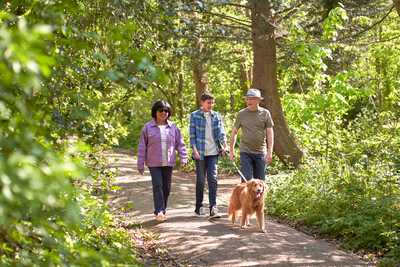Diet and physical activity after acute lymphoblastic leukaemia (ALL)
You might start to think about your diet and physical activity after ALL treatment.
Exactly what you can do varies. It depends on the treatment you have had and how fit you are.
Diet and ALL
Diet plays an important part in coping with cancer and its treatment. A good, well balanced diet can help you feel stronger, have more energy, and recover more quickly. When you are having treatment for ALL, eating can sometimes be a challenge and knowing what to eat can be difficult.
After treatment, most people can eat whatever they want.
While having treatment your weight may have changed, and you might have lost weight. This may be because of your treatment side effects such as:
-
loss of appetite
-
taste changes
-
feling sick
-
a sore mouth
-
constipation or diarrhoea
Or you might have put on weight from the steroids you had as part of your treatment.
If you still find it difficult to eat, you can try high calorie and high protein drinks. You might have had these drinks during treatment. Once your treatment has finished, you should begin to feel better and be able to eat a normal diet. This can take a while after intensive treatment.
What foods should I eat?
After having cancer, many people look at their diet and make changes, deciding to choose healthier options.
For a healthy diet, eat mostly:
-
vegetables
-
fruit
-
wholegrains like whole meal bread, brown rice and rolled oats
-
healthy sources of protein like fish, chicken and pulses (such as beans, lentils and chickpeas)
Have less:
-
processed and red meat
-
sugary drinks
-
high calorie foods like fast food and food high in sugar
-
alcohol
What should a meal include?
It is important to eat a varied diet. This includes a range of food in the right proportions and drinking plenty of fluids. But this doesn’t mean you can’t allow yourself the occasional treat.
The diagram below shows you how much of each food group you should eat each day to follow a varied diet.

This diagram is called Eatwell Guide. We have Eatwell Guides for people who follow African, Caribbean, South Asian and vegan diets.
Ask your healthcare team if you have any questions about your diet following your cancer treatment
Diet after a stem cell transplant or CAR T-cell therapy
During treatment your team may have advised you to make changes to your diet. This is to reduce the chance of picking up an infection from your food.
Check with your doctor or nurse what you can eat after your  or CAR T-cell therapy. Your immune system might take some time to recover so you might need to be careful with food hygiene for a few months. The advice can vary slightly between hospitals.
or CAR T-cell therapy. Your immune system might take some time to recover so you might need to be careful with food hygiene for a few months. The advice can vary slightly between hospitals.
General advice includes:
-
eating only freshly cooked food
-
avoiding undercooked eggs
-
avoiding soft cheese and blue cheese
-
avoiding creamy cakes and puddings
-
avoiding shellfish
-
washing salads and fruit very thoroughly
-
avoiding takeaways and fast food restaurants (or make sure they make you freshly cooked food)
Don't drink more than the recommended level of alcohol. Ask your doctor if alcohol will interfere with any medicines you are taking.
Physical activity and ALL
You might feel less physically fit after treatment for ALL. Physical activity is a great way to help you feel better, both physically and emotionally.
It can help to:
-
improve your heart health and strength
-
reduce tiredness (fatigue)
-
reduce symptoms of anxiety and depression
But it is important not to overdo it. How much you can do will depend on how fit you are and how you feel. You will probably have days when you don’t have so much energy. Listen to your body and build up slowly.

Gentle walking is suitable for most people to start with. If you don't have a central line, you can do most contact sports and swimming once your  are back to normal and you feel up to it.
are back to normal and you feel up to it.
Ask your doctor or specialist nurse when you can do more physical and strenuous activities.



